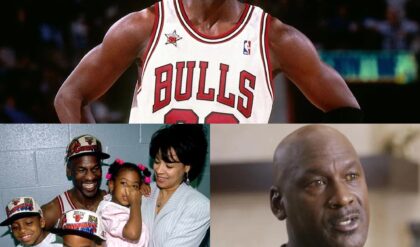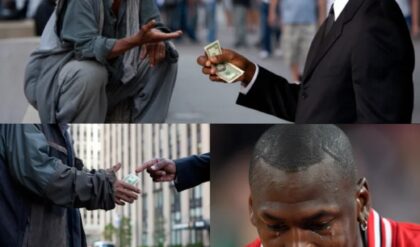I’ll always think of Rick Grimes stumbling forward, beaten sirloin bloody, gaping hole in his tummy opening a viewing portal through his back. Andrew Lincoln is a pretty man with a pleasant accent, and the primal plotlineWalking Dead always returned to was Passion of the Christing him through a gory spincycle of pain. In the very first episode, eight years ago, Rick was shot comatose. It only ever got worse.
As a rule, the quality of an individual episode in the show’s first six seasons was inversely proportional to how good Rick looked therein. If he was all cleaned up, refreshed from a secure night’s sleep in a walled community with workable plumbing? You sensed a midseason snooze: where’s Sophia, Lori’s ghost, should we talk about the Governor again, no let’s have a long philosophical discussion about societal issues we’ll forget when a walker attack forces us into a mournfully awesome action rage.
If Rick looked bad, though? Like, season 3, episode 1, “Seed,” sweaty and dirty after eight months hard nomad living? Like, season 4, episode 9, “After,” pummeled halfway dead with a voice like a hacking cough? When he bit that dude’s neck wide open? Whenever Rick Grimes looked, well, grimy? You were in for a ride, man.
Lincoln’s performance wasn’t just an endurance ritual. But Rick started off as a talker who liked talking (“He talked about the deer!!”) and the character bloomed whenever Walking Dead reduced him to the barest caveman survival instincts. Rick’s ongoing suffering was the connective tissue cohering three rather whiplash-y showrunner eras. Initial developer Frank Darabont interpreted Robert Kirkman’s comic book hero as a cowboy in civilization’s ruins. Glen Mazzara briefly reconceived Rick as a half-mad generalissimo squadding a corps of apex zombie crunchers into a riotously un-safe haven where people kept dying. Scott M. Gimple always wanted Rick to think big about society’s future: cultivate the soil! develop trade relations! Call a town meeting! But Gimple’s run highwatered with that great stretch from midseason 4 through midseason 5, when Rick was just the guy leading his people through the wilderness, so biblical he grew a patriarch’s beard.
You could also guess an episode’s quality by taking the length of Lincoln’s beard and multiplying it by the scruffiness of his hair. And the single best ever moment of Rick Grimes Talking came in “Them,” season 5, episode 10. It’s The Big Speech, really, the one where Rick — looking fullblown hobo Lear while a thunderstorm rages outside — revealed a philosophy of living that denies life itself. “This is how we survive,” he preached. “We tell ourselves that we are the walking dead.”
Rick was, at times, a terrible leader. He made unlikely plans that were doomed to fail. It got fun to play the meta-game of Walking Dead strategy, joking about Rick’s weird notions (like guiding a giant zombie mob right by his walled community.)
But he had compelling message. It was a kind of communal nihilism, we’re all in this hellhole together, everything’s misery so let’s keep going. Rick symbolized how this show became a new kind of depression entertainment. It was twisted escapism, quite possibly unhealthy. It wasn’t fun to watch Rick suffer. It was fun to watch how his suffering — losing a best friend, losing a wife, losing a son, losing friends — made him stronger.
It was a new kind of heroism — a new kind of masculinity, maybe — where a big part of the appeal was a state of constant affront. An action hero like Steve McQueen always looked cool, untroubled. An action hero like Arnold Schwarzenegger looked invincible. An action hero like Rick Grimes looked perpetually half-dead and constantly vulnerable. You watched him a state of constant tension, tension you might feel if you thought the border was constantly under attack, tension you might feel if someone told you the next election was the last election that would ever matter. I think this explains some aspect of the sheer overwhelming success of The Walking Dead. The different poles of our country agree on very little, but there is a shared sensation of constant attack. Rick was literally made to suffer, and Lincoln suffered mightily, often literally attacked multiple times a week. He aged vividly, going gray the way young presidents do.
:max_bytes(150000):strip_icc():format(webp)/twd_408_gp_0730_0497-1-2000-cc1867644043498ba0ce83de98a7a6e8.jpg)
GENE PAGE/AMC
Not long after The Big Speech, though, something in the show’s treatment of Rick started to get obnoxious. You got the vibe that you were meant to feel that his suffering sanctified him. It was an unhealthy appeal: Everything he did was justified, so it wasn’t even like the old days watching The Sopranos, when you had to feel a guilt twinge about enjoying some protagonist’s bad behavior. And to be frank, Rick became a bit of a pill. He walked into a lovely community, told all the nice folks they were soft, and seemed to will a zombie attack into existence. Then Rick pitched his friendfamily as, basically, a righteous deathsquad-for-hire. I think that, around this point, Walking Dead needed to come up with an antagonist morally ambiguous enough to suggest Rick might have gone truly off the reservation. Maybe some dashing Robin Hood-ish maniac who’d ask serious questions about this neo-Spartan killocracy Rick was building. (In my head I’m picturing, well, Andrew Lincoln, but Andrew Lincoln the playful British jokester who popped up occasionally on Talking Dead.)
Instead we got Jeffrey Dean Morgan’s Negan, who spent a very long episode bashing beloved brains outward. The Negan years were remarkably unpleasant. Viewers fled, gradually then suddenly. I would guess that, like me, a decent chunk checked back in for Sunday’s “What Comes After,” billed as Rick Grimes’ Last Episode. It was a ludicrous hour of television, but it honored some essential truth about the character by forcing him to spend the entire runtime slowly bleeding out of a gigantic stab wound.
There was an oddly low-rent quality to the proceedings I couldn’t put my finger on. Rick had gotten his wound by just, like, falling onto a rebar pipe. He saw visions of various dead people, and even the impossibly resonant presence of the late Scott Wilson couldn’t hide how gawky and greenscreened those sequences looked. (Sonequa Martin-Green looked transmitted in from a Star Trek: Discovery communication hologram.)
Lincoln’s fully committed performance got me toward the end. I think the better version of this episode would’ve just been long steady shots of Rick walk-crawling away from walker hordes. A spin through an attacked encampment was a vintage Rick Grimes action scene: Firing his bobcat-sized Magnum revolver, shooting the last walker RIGHT as it fell atop him. His last walk across the bridge was an emotional swell. When he shot a fistful of dynamite, it felt just right. Of course, Rick had to die by suicide. Of course, that suicide had to also be heroic, a final messianic act of rescue. Of course, that rescue also had to be a gory mass zombie murder: He could always talk about building a new society, but his mission in life was to cascade a river of walker blood.
The show cut to commercial after the explosion, and I didn’t know what to expect. Another trip to the dreamy afterlife? A flashback to Rick asleep in the hospital, one final nudge to the deathdream theory? With mere minutes of muted advertisements, I wondered if the last shot would be a dark joke: Zombie Rick Grimes, burnt to a crisp, missing a couple limbs, crawling off into the forest, even deader than he used to be.
Hahahaha! Well so, apparently this was one of those dynamites where the explosion pulls you closer without hurting you. Rick somehow fell forward into the river, washing up down the shore right in front of a helpful plot point. The physics are unusual. The sheer advertorial jones of this narrative gambit — a whole episode spent building towards a death that doesn’t happen! — is so unbelievable I can only applaud. We last saw Rick up in the air — completing a deep canon journey that began when he saw a helicopter above Atlanta, I guess would be one explanation for all this. Movies loom.
This sendoff episode was, to a certain extent, also a backdoor pilot for a bold Walking Dead reset. New showrunner Angela Kang’s direction is intriguing, though I scan worrying old symptoms. The non-Rick subplot of the episode was: “Maggie wants to kill Negan, talks about killing Negan, doesn’t kill Negan.” I wonder sometimes if the whole Walking Dead endeavor needs a truly radical reinvention, if viewers have just grown tired after a near-decade of somber jeans-y sadsacks who kill zombies good. The whole undead genre needs, like, a Ragnarok moment, a vision that reintegrates sharkpunching excess, or successfully acknowledges the eerie fact that the dominant escapist fantasy this decade was the one where humans don’t have to feel bad about killing other humans. (They’re dead already, chop, smash, bang, BLOOD!) The preview for the rest of this season hinted that the zombies were evolving — a good sign, and maybe a very meta promise that this nine-year-old series recognizes the necessity of change.
In an interview with Yvette Nicole Brown on Sunday’s Talking Dead, Lincoln summed up Kang’s big pitch on Rick’s farewell: “We want him to be a hero on his way out.” This is the sentimental side of Walking Dead shining through, and it left the whole adventure feeling a bit misshapen. This could have been a final reckoning with all sides of Rick’s troubled legacy. Instead, it was a long walk to spinoff territory. I admit to being interested in what I choose to call the Ricking Dead movies, because the prospect of standalone features implies new possibilities, new settings, something more for Rick Grimes than endless waiting for some new group to attack Alexandria.
But I worry the comparison point here is, like, Jack Bauer, the madman government agent played by Kiefer Sutherland for five good seasons and then three bad seasons of 24. Past a certain point, Jack’s ongoing existence became a matter rank capitalism: rumors of a movie, rumors of a Die Hard crossover, one revival with the character already, surely another one eventually. Will this be Rick’s future? Rebooted in familiar circumstances to diminishing returns, while eternal teases promise an eventual return trip to the original series? Be careful, AMC. If you bet that a franchise will never die, it might be dead already.

